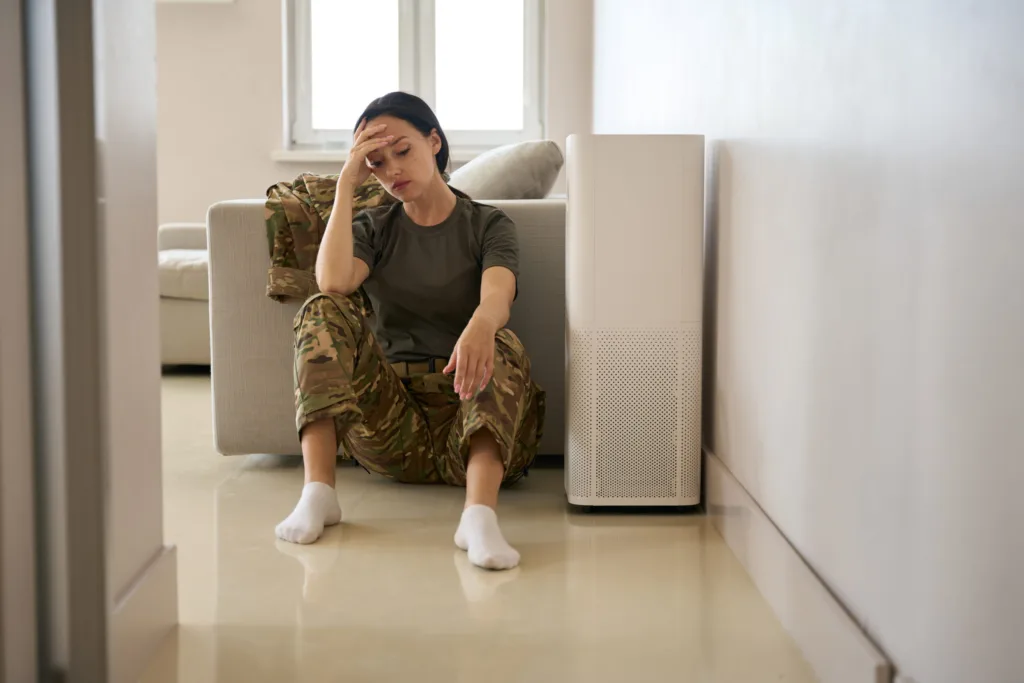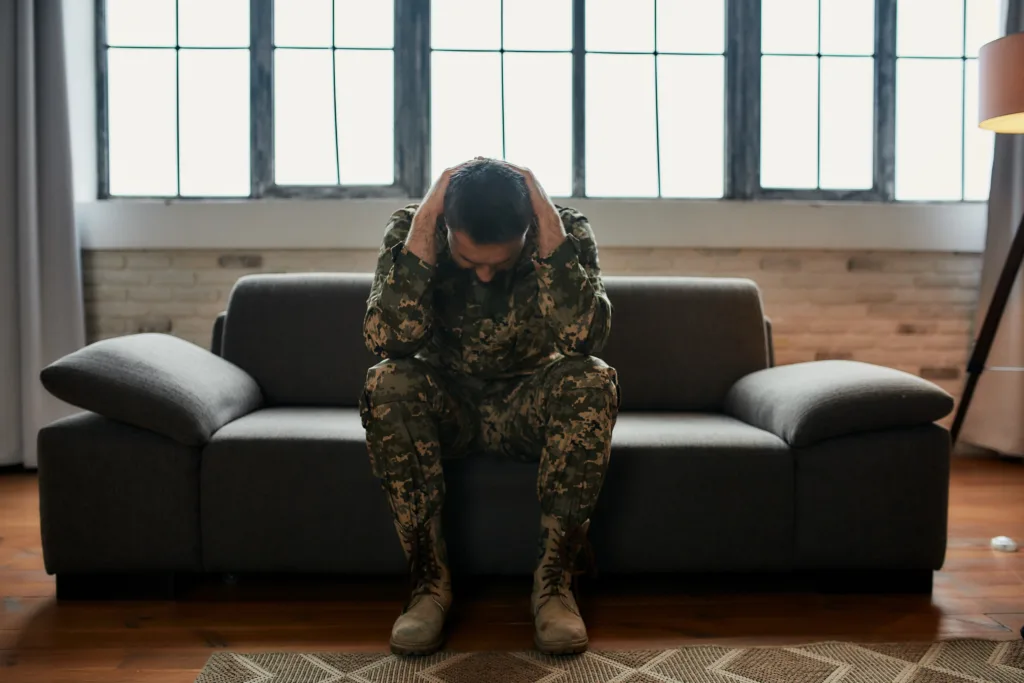Treatment for Anxiety in Veterans

A 2013 study published in Psychiatry Research found that approximately 12 percent of veterans are diagnosed with generalized anxiety disorder, which is 4-6 times higher than the general population. Veterans Affairs reports that more than 1.7 million veterans received treatment in a VA mental health specialty program in 2018, though anxiety disorder as a primary diagnosis has been overlooked in veterans, as most mental health research on veterans focuses on post-traumatic stress disorder (PTSD).
Treatment modalities to help veterans overcome anxiety will mirror treatment for civilians, although veterans often require treatment for co-occurring disorders, such as mental health dual-diagnoses (e.g., PTSD and anxiety) and/or substance use disorder. According to a study published in the journal Substance Abuse and Rehabilitation, 82–93 percent of the Iraq and Afghanistan War veterans who have been diagnosed with a substance use disorder were also diagnosed with another comorbid mental health disorder. Additionally, the dearth of research on anxiety in veterans means that there is little understanding of how veterans prefer to receive treatment, as reported in the journal Families, Systems, & Health.
Types of Anxiety
Anxiety in veterans can develop over time during or after service, as a byproduct of the hypervigilance required during active deployment, during the transition back to civilian life or as a symptom of co-occurring disorders within particular circumstances, such as managing PTSD and chronic pain while finding civilian employment.
Veterans are likely to experience one or more of the following types of anxiety:
- Generalized anxiety (GAD): GAD usually involves a persistent feeling of anxiety or dread, which can interfere with daily life. It is not the same as occasionally worrying about things or experiencing anxiety due to stressful life events. People living with GAD experience frequent anxiety for months, if not years.
- Social anxiety disorder: Social anxiety is an intense, persistent fear of being watched and judged by others. For people with social anxiety disorder, the fear of social situations may feel so intense that it seems beyond their control. For some people, this fear may get in the way of going to work, attending school or doing everyday things.
- Panic disorder: People with panic disorder have frequent and unexpected panic attacks. Panic attacks are sudden periods of intense fear, discomfort or a sense of losing control even when there is no clear danger or trigger. Not everyone who experiences a panic attack will develop panic disorder.
(via National Institute of Mental Health)
Someone should seek treatment for anxiety when it begins to interfere with regular daily activities, employment, concentration or sleep.
Treatment
Clinical treatment modalities
Anxiety is generally treated with clinical intervention through psychotherapy (talk therapy), which gives people practical tools to incorporate into their daily lives to manage anxiety symptoms. The following treatment modalities are evidence-based and have been found to be the most effective in treating anxiety:
Cognitive behavioral therapy (CBT)
CBT is a short-term treatment that helps veterans understand the anxiety they experience and address distressful thoughts and feelings. This treatment may expose veterans to anxiety-inducing situations to help develop response-prevention strategies. CBT is focused on identifying and neutralizing unhelpful thoughts and also confronting fears through the mastery of new skills (via Veterans Affairs).
Acceptance and commitment therapy (ACT)
ACT aims to help veterans live with unpleasant thoughts, feelings and impulses without avoiding them or being controlled by them. In ACT, veterans are encouraged to commit to actions so that they can live life by their values, even in the face of these unpleasant experiences (via Veterans Affairs).
Dialectical behavior therapy (DBT)
DBT is based on CBT, but it’s specially adapted for people who experience emotions very intensely and has been proven effective in treatment for borderline personality disorder, self-harm, suicidality, PTSD and more. “Dialectical” means combining opposite ideas. DBT focuses on helping people accept the reality of their lives and their behaviors as well as helping them learn to change these behaviors (via Cleveland Clinic).
Non-clinical Interventions
In a Pew Research Center survey of 1,853 veterans, 44 percent of post-9/11 veterans reported that re-entry to civilian life was difficult, and it also found that veterans who experienced emotional or physical trauma while serving are at the greatest risk of having difficulties readjusting post-deployment. Adjusting to life outside of the structured and goal-oriented daily routines of the military can create a feeling of disconnect from life, family and friends, increasing chances of anxiety and mental health issues.
The following strategies can be used in conjunction with clinical intervention or as self-management strategies for anxiety:
- Set a schedule. Set a basic, daily schedule that includes physical and emotional nourishment, as well as things that bring joy. This may include meal times, exercise, sleep, or time carved out for hobbies and socializing with friends and family
- Connect with other veterans. Connecting with other veterans can provide invaluable support. Veterans Affairs has a list of national veteran service organizations here. Veterans can also search for local veteran meet-ups and groups in their area.
- Get veteran-focused care. The Peer Support Program through the VA is a care program for veterans in recovery that employs a Peer Support Specialist, a veteran who is certified to assist other vets during their treatment and recovery from substance use, during mental health treatment or while in sustained recovery. Click here to learn more and find nearby programs.
Developing strong social support is vital for anyone recovering from mental health issues but is particularly important for veterans adapting to life outside of the structure and camaraderie that military service provides.
How Pyramid Can Help
Pyramid’s Military Therapy & Recovery Programs treat mental health disorders, substance use disorders and co-occurring disorders. Our team of providers creates an individualized treatment plan to meet your needs using a variety of treatment modalities.



